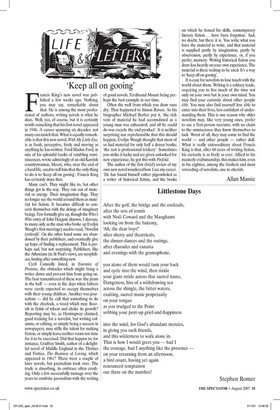'Keep all on gooing'
Francis King's new novel was published a few weeks ago. Nothing, you may say, remarkable about that. He is among the most professional of authors; writing novels is what he does. Well, yes, of course, but it is certainly worth remarking that his first novel appeared in 1946. A career spanning six decades: not many can match that. What is equally remarkable is that this new novel, With My Little Eye, is as fresh, perceptive, lively and moving as anything he has written. Ford Madox Ford, in one of his splendid books of rambling reminiscences, wrote admiringly of an old Kentish countrywoman, Mealy, who, near the end of a hard life, used to tell him that the only thing to do is to 'keep all on gooing'. Francis King has certainly done that.
Many can't. They might like to, but other things get in the way. They run out of material or energy. Their imagination flags. They no longer see the world around them as material for fiction. It becomes difficult to concern themselves with the doings of imaginary beings. Few formally give up, though the Who's Who entry of John Heygate (known, I daresay, to many only as the man who broke up Evelyn Waugh's first marriage) used to read, 'Novelist (retired)'. On the other hand some are abandoned by their publishers, and eventually give up hope of finding a replacement. This is perhaps sad, but not surprising. Publishers, like the Athenians (in St Paul's view), are neophiliacs, lusting after something new.
Cyril Connolly listed, in Enemies of Promise, the obstacles which might bring a writer down and prevent him from going on. The best remembered of these was `the pram in the hall' — even in the days when fathers were rarely expected to occupy themselves with their young children. Another was journalism — did he call that something to do with the charlock, a weed which may flourish in fields of wheat and choke its growth? Reporting may be, as Hemingway claimed, good training for a novelist, but writing columns, or editing, or simply being a success in newspapers, may stifle the talent for making fiction, or simply leave neither room nor time for it to be exercised. Did that happen to, for instance, Godfrey Smith, author of a delightful novel of Middle England in the Thirties and Forties, The Business of Loving, which appeared in 1961? There were a couple of later novels, but journalism took over. The trade is absorbing, its embrace often crushing. Only a few successfully manage over the years to combine journalism with the writing of good novels, Ferdinand Mount being perhaps the best example in our time.
Often the well from which you draw runs dry. That happened to Simon Raven. As his biographer Michael Barber put it, `the rich vein of material he had accumulated as a young man was exhausted, and all he could do was recycle the end product'. It is neither surprising nor reprehensible that this should happen; Evelyn Waugh thought that most of us had material for only half a dozen books; `the rest is professional trickery'. Sometimes you strike it lucky and are given unlooked for new experience; he got this with Pinfold.
The author of the first (brief) review of my own new novel wondered how I see my career. 'He has found himself rather pigeonholed as a writer of historical fiction, and the books on which he honed his skills, contemporary literary fiction ... have been forgotten.' Sad, no doubt, but there it is. You write what you have the material to write, and that material is supplied partly by imagination, partly by observation, partly by experience, or, if you prefer, memory. Writing historical fiction you draw less heavily on your own experience. The material is there waiting to be used. It's a way to 'keep all on gooing'.
It is easy for novelists to lose touch with the world about them. Writing is a solitary trade, requiring you to live much of the time not only on your own but in your own mind. You may find your curiosity about other people ebb. You may also find yourself less able to enter into their lives, less confident of understanding them. This is one reason why older novelists may, like very young ones, prefer to use a first-person narrator, with no claim to the omniscience they know themselves to lack. Worst of all, they may come to find the world — and other people — rather dull. What is really extraordinary about Francis King is that, after 60 years of writing fiction, his curiosity is as lively as ever. Allied to his masterly craftsmanship, this makes him, even in his eighties, among the freshest and most rewarding of novelists, one to cherish.
Allan Massie








































 Previous page
Previous page